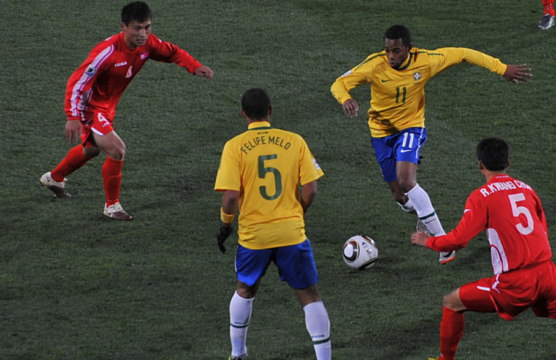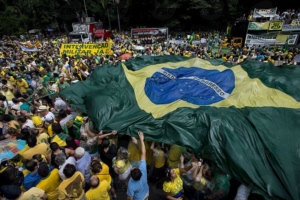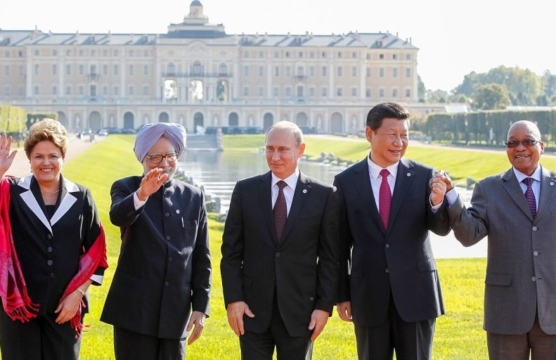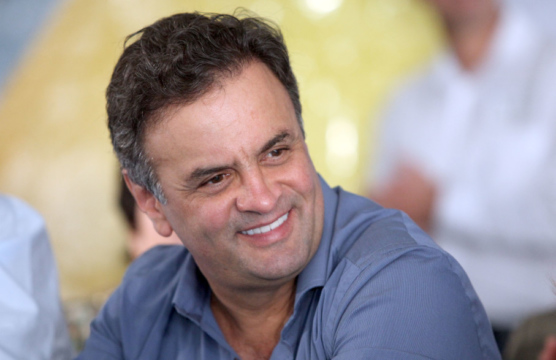
World Cup Focuses Chinese Media Attention on Brazil
Chinese media attention focused on Brazil and the World Cup in June.
This post is also available in: Spanish
Brazil has never been a priority interest of US foreign policy. Still, the country’s debilitating problems—combining economic reversals, spreading corruption scandals, and a weak, unpopular government—have now aroused considerable attention in Washington and the US media. Indeed, they seem to be of far greater interest than Brazil’s spectacular rise just a few years ago. It may be that, in the US capital, crises are far more compelling than triumphs. But, whatever the reason, Brazil’s failings have generated more questions and commentary than its economic and diplomatic successes. What follows are several of the questions I hear most frequently, along with my responses.
No one can be sure what will happen. Brazil is in uncharted territory. But it now looks probable that Rousseff, Brazil’s first female leader, will finish out her four-year term. Few Brazilians expect her to resign. Impeachment, which requires a two-thirds vote in both houses of congress, looks like the only path to removing her from office. And that is a very high bar, likely to be attained only if she is linked to a serious criminal violation, for which no credible evidence has yet emerged. She could also be charged with misuse of authority or malfeasance, but that would turn the impeachment process into a partisan political battle, which she would likely win. Even though her poll numbers remain at rock bottom, the president has regained some of her political footing in recent weeks.
First of all, her principal adversary in congress, Eduardo Cunha, the leader of the lower house, who holds the trigger for the impeachment proceedings, has himself been formally charged in the country’s major corruption scandal (see below). Although he retains his leadership post, his influence has receded. And despite Cunha’s defection, his party, the PMDB, the largest in congress, remains part of the president’s governing coalition. There are persistent rumors that the PMDB may withdraw its support in the coming months, but two key party leaders are today lined up with the president and oppose her removal. One is the head of the senate, Renan Calheiros, also under investigation, but not yet charged, and the other is Brazil’s vice president, Michel Temer, who has been serving as the president’s congressional liaison (although he may soon withdraw from this apparently painful and unrewarding task). The situation in congress is fluid and uncertain, for sure, but the prospects of impeachment now appear s to be fading.
Additionally, the most important opposition party, the PSDB, whose candidate, Aecio Neves, narrowly lost the presidential election last October, is divided on the issue of impeachment, mirroring, in large measure, the differing views of Neves and two other leading contenders for the party’s presidential nomination in 2018. The strongest voice of the PSDB, however, is that of its iconic leader and only successful candidate for the presidency, Fernando Henrique Cardoso. Once firmly opposed to Rousseff’s removal from office, which he worried might discredit Brazil’s democratic institutions and set and unwanted precedent for future governments, Cardoso’s public statements have recently become more ambiguous. He has even questioned Rousseff’s legitimacy to remain in office.
Impeachment may be unlikely, but the president is by no means secure in her post. The political costs of economic stagnation and inflation will surely mount in the coming months as more and more jobs are lost and family incomes decline. The still unfolding Petrobras affair will also keep her approval ratings low. Anti-Rousseff street demonstrations will probably continue and could grow more virulent. And there are other signs that her political position, while stronger today, is still precarious. The president’s support within her own Workers’ Party (PT) has decreased, with a large majority of members opposing her austerity policies. The party itself has been badly shaken and deflated by the revelations of its central role in the corruption scandals, the arrests and imprisonment of key leaders, and the deeply tarnished reputation of its founder and most popular leader ever, former President Lula da Silva, who is now under federal investigation for influence peddling. Lula has long been Rousseff’s mentor, chose her to succeed himself, and played a critical role in her recent re-election.
All of these problems are compounded by Rousseff’s limited political and communication skills. Although elected twice, the president does not have an appealing personality or style. She has not been effective in making her case to congress and less successful yet in mobilizing popular support, even among her own party members and other supporters. Hard times can severely test the capacity of national leaders to explain their country’s problems to ordinary citizens, reassure and inspire their people, and point with confidence toward solutions.
If sufficient evidence emerged that she were criminally involved in one or another corruption scheme, or that she had demonstrated malfeasance in office, it would be virtually impossible for her to continue governing. She would lose the authority and credibility needed to lead. Under those circumstances, the judicial system and congress should certainly seek to remove her. Failure to act would cast a shadow over all of Brazil’s institutions of government, and probably worsen the nation’s crisis of governance.
But without clear evidence of guilt, the removal of the president, even if carried out with honorable intentions and favored by a sizable majority of the population, would be viewed by many as politically partisan and perhaps illegitimate. Politicians and parties could be seen as bending the rules and disregarding institutions and laws to serve their own ambitions. And it is unlikely that much will be gained.
A change in leadership would not bring an end to Brazil’s financial and economic problems. A new president might produce an up-tick in consumer and business confidence, but it could well also generate new uncertainty and create the risk of serious, difficult to forecast, disruptions in government and markets.
A change in leadership would not bring an end to Brazil’s financial and economic problems. A new president might produce an up-tick in consumer and business confidence, but it could well also generate new uncertainty and create the risk of serious, difficult to forecast, disruptions in government and markets. So far at least, no one has yet offered a serious alternative to the Rousseff government’s approach to Brazil’s economic challenges. Indeed, aside from insistent criticism from groups seeking to protect their particular interests, there is not much debate at all about the formula for recovery. And of course, the country’s economic future depends on more than the government’s domestic policy choices. Falling demand for Brazil’s commodity exports, a weak and volatile global economy, and declining investment flows to emerging market economies are together taking a huge toll on Brazil.
Nor is there reason to believe that a new government would manage the corruption investigations and trials more effectively, or that it would do a better job of cleaning up corrupt practices. President Rousseff has supported the full investigation and prosecution of corruption allegations. She has basically adopted a “hands off” approach for the executive branch, giving prosecutors and judges the full independence required by their office and the country’s constitution. In just the past month, she reappointed the lead judge and prosecutor in the Petrobras affair, who are widely admired in Brazil for their competence and hard-nosed determination to identify and punish those responsible.
The Brazilian economy has been severely damaged, worse than had been thought, and is responding far more slowly than expected to the government’s corrective efforts. For nearly eight years (2004 to 2011), Brazil had prided itself on its steady, solid growth, low inflation, high employment, an expanding middle class, declining poverty, and a trend toward greater equality. These gains are now all at risk as both government and private analysts forecast that it will take another year or two before the economy even starts to grow again.
It is also true, however, that most other Latin American countries and virtually all large emerging market economies are slumping. Moreover, the Brazilian economy, which has successfully recovered from other, more severe downturns in the recent past, is far healthier at its core than in other periods of economic reversal. Most importantly, there is greater consensus today on what is wrong with the economy and what has to be done to recharge it and maintain a sustained trajectory of growth. Still, an enfeebled, unpopular president and an erratic and fragmented legislature are making it tough to produce the fiscal tightening and other reforms needed for recovery. Only a few months ago a fiscal surplus was expected for 2016, but next year’s budget now projects a deficit, which threatens the country’s investment grade credit rating.
It may take a few years or more, but Brazil should be able to reclaim its position of international leadership. Even with its current mix of economic, social and governance problems, Brazil continues to carry some substantial weight in regional affairs and on many multilateral issues
Foreign policy aspirations will have to be postponed, but not abandoned or seriously modified. It may take a few years or more, but Brazil should be able to reclaim its position of international leadership. Even with its current mix of economic, social and governance problems, Brazil continues to carry some substantial weight in regional affairs and on many multilateral issues.
Corruption has long been systematic and pervasive in Brazil. In 1992, Fernando Collor, the first elected president of Brazil since military rule began in 1964, was impeached on charges of corruption. In the past ten years, two massive corruption scandals have ignited political firestorms. Billions of dollars in public funds were stolen to bribe politicians, finance election campaigns, and generate kickbacks for powerful private firms. Both were set in motion by senior government officials and top political party leaders, mostly from the Workers’ Party of President Rousseff. The corruption has involved Brazil’s wealthiest enterprise, its state owned oil company Petrobras, other public corporations and government agencies, and nearly a dozen of its largest private construction companies. The recent exposure of FIFA’s thoroughly corrupt global operation also cast the spotlight on the corruption of Brazil’s national soccer federation and most of the “futbol” clubs which command the loyalty and passion of so many Brazilians.
 It is, however, encouraging to see the aggressive response of the Brazilian press and the country’s judicial and law enforcement agencies to the recent scandals. Senior government officials, party and congressional leaders, corporate CEOs and other top executives are being investigated, charged, arrested, convicted, and jailed—without political interference or favoritism. Some in Brazil argue that the current scandals may be cathartic for the country, that they may be pointing the way to more transparent politics, less corrupt government, and more accountability in all institutions. A conclusive judgment will have to wait, of course. What is going on in Brazil may be the transitory work of a few heroic judges and prosecutors—and reflect the weaknesses of the other branches of government. But just as well, it could be that the nation’s judicial institutions are stronger, more competently led and staffed, and able to operate more autonomously than ever before—and are in a position to help set a new direction for the rest of the Brazilian government.
It is, however, encouraging to see the aggressive response of the Brazilian press and the country’s judicial and law enforcement agencies to the recent scandals. Senior government officials, party and congressional leaders, corporate CEOs and other top executives are being investigated, charged, arrested, convicted, and jailed—without political interference or favoritism. Some in Brazil argue that the current scandals may be cathartic for the country, that they may be pointing the way to more transparent politics, less corrupt government, and more accountability in all institutions. A conclusive judgment will have to wait, of course. What is going on in Brazil may be the transitory work of a few heroic judges and prosecutors—and reflect the weaknesses of the other branches of government. But just as well, it could be that the nation’s judicial institutions are stronger, more competently led and staffed, and able to operate more autonomously than ever before—and are in a position to help set a new direction for the rest of the Brazilian government.
Brazil is going through a hellish period, perhaps its worst since democracy was restored in 1985. It is confronting a three-pronged crisis—a shrinking economy and the prospect of a prolonged recession; spreading corruption scandals involving the country’s premier institutions, public and private, and many of its political and corporate leaders; and a discredited and unpopular government. Each aspect of the crisis compounds the others and makes them more difficult to resolve. Yet some positive strains are visible. The president and her advisors appear clearly to understand the dimensions and substance of the challenges, and are working pragmatically to address them. Brazil has certainly faced and recovered from grimmer economic circumstances, like an extended period of hyperinflation two decades ago, when the country was far poorer and its institutions weaker. And corruption is hardly a recent arrival in Brazil.
Brazil’s central challenge is a crisis of governance and leadership. Rousseff lacks many of the political and diplomatic skills needed to navigate Brazil’s charged environment.
Brazil’s central challenge is a crisis of governance and leadership. Rousseff personally lacks many of the political and diplomatic skills needed to navigate Brazil’s charged environment. Both the legislature and the party system are fragmented, and bitter rivalries within and between parties dominate the day-to-day agenda. The question is whether Brazil’s contending leaders and factions will end up moderating their differences and begin to converge on practical solutions to their nation’s troubled economy and society. The many historical precedents for such compromise and convergence are today the principal grounds for optimism. Deep discord has been overcome at many difficult junctures in the past, including the transition to civilian rule in 1985, President Collor’s impeachment in 1992 and 1993, the squelching of hyperinflation in 1994 and 1995, and the presidential transition from Cardoso to Lula in 2002 and 2003. It is not unreasonable to believe that this is what will happen again.
Chinese media attention focused on Brazil and the World Cup in June.
The creation of the New Development Bank, also known as the BRICS bank, was announced at the BRICS summit in Brazil.
In the lead-up to Brazil’s presidential elections, Chinese media reports have offered varied perspectives on China-Brazil relations.

